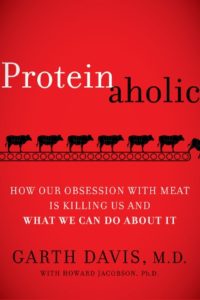This week I am doing a book review on the above book “Proteinaholic: How our obsession with meat is killing us and what we can do about it” by Dr. Garth Davis. Garth Davis is a surgeon who specializes in gastric bypass. Gastric bypass surgery shrinks the size of your stomach (so you can’t eat as much as you used to) and “bypasses” part of your digestive system so you don’t absorb as much food.
In this book, Dr. Davis talks about how he was once obsessed with protein and it was actually damaging his health. He was once an advocate of a high protein diet and consumed a lot of meat, dairy, and eggs (in addition to recommending it to his patients). He began to make changes after his wife was pregnant with his first child, and he found out that he had high cholesterol and elevated liver function tests. He also did not feel well. He was suffering from irritable bowel syndrome, overweight, and fatigued.
Dr. Davis started researching how he could improve his health. This book is a summary of the research that he found in journal articles and books which convinced him to change his diet. These days he feels much better. His cholesterol is normal, and his irritable bowel syndrome is gone. He is in phenomenal shape and competes in marathons and iron man triathlons, so he obviously no longer experiences the fatigue he was experiencing on the high protein diet.
I found some of the insights he had about gastric bypass surgeries and patients who seek out gastric bypass interesting. He writes about how some of the patients who have bariatric surgery done lose weight and then become obese again. For the first year or two, people lose weight as they are forced to cut calories since their stomachs are so much smaller. However, two to three years later, some patients gain back weight (since their stomachs begin stretching again) and have nutritional deficiencies because they are still not eating a healthy diet well and part of their digestive system has been “bypassed”.
Now, he continues to conduct gastric bypass surgery but encourages his patients to try eating a plant-based diet first. Many of the patients ask how they can get enough protein on this type of diet. He checks the labs of all his patients and says that the meat eaters actually have very poor nutritional results, deficient in vitamin D, folate, thiamine, vitamin A, and B12. He does not have much information about vegetarian patients because vegetarians do not usually end up in a weight loss clinic. He could only think of one patient in over ten years, who was vegan and addicted to vegan baked goods. This vegan patient had a wonderful cholesterol profile and no vitamin deficiencies, as well as no heart disease or diabetes.
Many of the patients he sees in his clinics continue to be fixated on getting enough protein. In fact, he states that he wrote this book partly so he could stop having the same conversation with his weight-loss patients. To paraphrase his conversation, the patient states that they are trying (high protein) diets and cannot lose weight. The patient tries to avoid carbohydrates and makes sure s/he gets enough protein. When he tells his patient that the carbohydrates are not the problem and they are actually getting too much protein, the patient does not believe it. The patient states that what is Dr. Davis is saying is contrary to what they have heard all their life and fixate on the fact that they are eating too many carbohydrates. I completely related to this situation, as I have had many similar conversations with patients that I have advised dietary changes for improved health!
Dr. Davis provides us an in depth history of how our country’s obsession with protein began from the earliest high protein diets to the more recent “paleo” diet. Patients often lose weight initially because they are eating less calories but gain the weight back within a year (in multiple studies referenced in this book). Side effects of the “Atkins diet” include nausea, headache, fatigue, bad breath, and constipation (since it is basically devoid of fiber). Other undesired side effects include heart disease (from a high fat diet), evidenced by the fact that Dr. Atkins himself suffered a heart attack from his high protein diet. When Dr. Atkins passed away, he was an obese 258 pounds (for his height of 6 feet). Another high protein advocate, Stephen Byrnes of the Weston Price Foundation (who called himself a “recovering vegetarian”) died of a stroke at the age of 42.
Dr. Davis then gives a summary of evidence based studies about the ill effects of a high protein diet including diabetes, hypertension, heart disease, obesity and cancer. He begins with telling us that meat (and not carbohydrates) is the major cause of diabetes. The European Prospective Investigation into Cancer (EPIC) and Nutrition study followed 521,000 people from ten european countries for 12 years. EPIC researches found that meat is significantly associated with development of type 2 diabetes, whereas fruit and vegetable consumption is associated with a decrease in diabetes. Similar research findings exist for the Adventist Health Study of Loma Linda, the Nurses’ Health Study, and the Women’s Health Initiative. The Adventist Health Study and EPIC also found a lower rate of hypertension of vegetarians than meat eaters. He cites the research of Dr. Dean Ornish (refer to my previous blog) and Dr. Caldwell Essylstein reversing heart disease with a plant-based diet. In his chapter on how protein causes weight gain, he talks about how easy it is to lose weight on a low fat, low protein and high carbohydrate diet. The high fiber in a whole foods diet causes satiety and prevents overeating. He lists Terry Shintani’s Waianae Diet study in Hawaii as an example. The chapter about cancer risks of a high protein diet delineates the risks of carcinogens found in high quantities in animal products such as heterocyclic amines, heme iron, N-nitroso compounds and the protective effects of antioxidants found in a plants.
Americans consume on average around 130 grams of protein daily according to the World Health Organization. The recommended daily allowance (RDA) of protein is just 45-55 grams daily or 0.8g/k of lean body mass (not total body weight). Lean body mass is total body weight minus fat. Many Americans still live in fear of developing protein deficiency or Kwashiorkor, which is actually a disease of combined protein and caloric deficiency. This is so rare that I have never seen this before. Dr. Davis addresses the concerns of special populations, such as athletes, coming to the conclusion (from multiple studies) that most fit people will obtain enough protein by getting the U.S. RDA requirement. Some athletes that concentrate instead on getting high carbohydrates actually have flourished, such as Michael Arnstein, a fruitarian and one of the top ultra runners in the world, who lives in Hawaii.
Near the end of the book, Dr. Garth Davis addresses some of the common concerns of people who might want to transition to a plant based diet. He debunks some common myths about vegan diets. People are very concerned about nutrient deficiencies, and vegans can develop B12 deficiency; but B12 is very easily supplemented. People are also concerned about osteoporosis because vegans do not eat dairy products. He tells us about a review of 34 studies showed that people who consumed animal products actually had more risk of hip fractures than vegetarians. The problem with obtaining calcium from animal products is that calcium is used to buffer acid and is leached from the bone when one consumes an acidic high protein diet. People are afraid to become anemic from a vegan diet, but in fact vegans are not any more prone to anemia than meat-eaters and actually avoid some of the ill-effects of heme-iron. There is another myth that vegetarians are more likely to be hypothyroid. Actually vegans are much less likely to be hypothyroid than meat-eaters. Another myth people believe is that a plant based diet will decrease HDL (good cholesterol) levels. Actually I can dispel this myth because my HDL cholesterol is really high. It has been over 100 for many years, since I have been vegetarian for over 20 years!
I high recommend this book. Dr. Garth Davis dispels many of the myths that the general public believes. I deal with these misconceptions everyday when I try to explain to people how eating a plant-based diet can improve their health. This book inspired me to create the video below. Brian Heithaus used to be addicted to protein like so many Americans today, and he started getting some of the ill effects of the high protein diet (such as headaches, weight gain, and fatigue). Brian talks about how he was able to change his diet to a high carbohydrate diet and his problems went away!

